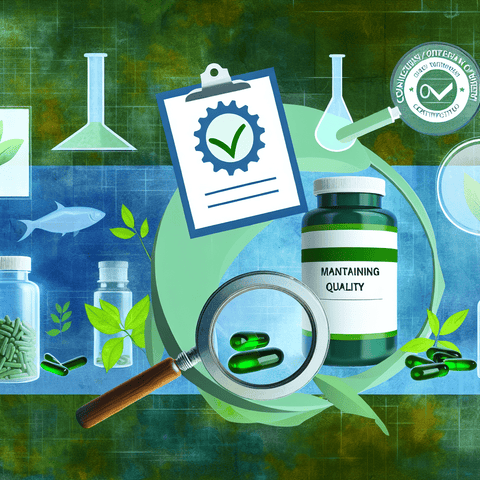Introduction
The dietary supplement market has seen exponential growth over recent years, with consumers increasingly turning to vitamins, minerals, and other products to enhance their health. However, with the plethora of options available, determining the quality of a supplement can be challenging. This guide aims to equip you with essential tips and guidelines to evaluate the quality of dietary supplements, ensuring you make informed and safe choices for your health.
Understanding Dietary Supplements
Dietary supplements encompass a wide range of products, including vitamins, minerals, amino acids, enzymes, and herbs. They are intended to supplement the diet and provide nutrients that may not be consumed in sufficient quantities. The quality of these supplements can vary significantly, influenced by factors such as the source of ingredients, manufacturing processes, and compliance with regulatory standards.
Recognizing Quality Standards
The quality of a supplement is often determined by its adherence to established standards. In the European Union, the European Food Safety Authority (EFSA) provides guidelines and regulations to ensure the safety and efficacy of these products. Consumers should look for supplements that have been tested for purity, potency, and composition to ensure they meet these standards. A reliable indicator of quality is certification from recognized bodies, such as Good Manufacturing Practice (GMP) certification.
Evaluating Ingredient Sources
The source of ingredients plays a crucial role in determining the quality of a supplement. Ideally, ingredients should be sourced from reputable suppliers with a track record of providing high-quality raw materials. For instance, [Vitamin D supplements](https://www.topvitamine.com/collections/vitamin-d-benefits-sources-safety) should be derived from natural sources such as fish liver oils or synthesized in a manner that mimics natural processes. Transparency in ingredient sourcing is a hallmark of a quality supplement brand.
Assessing Bioavailability
Bioavailability refers to the degree and rate at which a substance is absorbed into the bloodstream. A high-quality supplement should have a formulation that enhances bioavailability, ensuring that the body can effectively utilize the nutrients. For example, [Magnesium supplements](https://www.topvitamine.com/collections/magnesium-benefits-energy-muscle-bone-support) that are chelated or in citrate form are generally more bioavailable compared to other forms.
Checking for Third-Party Testing
Third-party testing provides an unbiased assessment of a supplement’s quality. Reputable brands often submit their products for testing by independent laboratories to verify label claims, check for contaminants, and confirm ingredient potency. Look for supplements that have undergone such testing, as it is a testament to the brand’s commitment to transparency and quality assurance.
Understanding Label Claims and Certifications
Labels on dietary supplements can sometimes be misleading, making it essential to understand what they truly mean. Claims such as "natural," "organic," or "non-GMO" should be backed by relevant certifications. Furthermore, ensure the supplement’s label provides comprehensive information, including ingredient list, dosage, and any potential allergens. Trustworthy brands provide clear and accurate labels to guide consumers in making informed decisions.
Considering Ethical and Sustainable Practices
In addition to quality, ethical and sustainable practices are becoming increasingly important to consumers. A high-quality supplement brand often prioritizes sustainable sourcing, ethical labor practices, and environmental stewardship. For example, [DHA and EPA Omega-3 supplements](https://www.topvitamine.com/collections/dha-epa-omega-3-supplements) derived from sustainably sourced fish oils are not only beneficial for health but also for the environment.
Conclusion
Determining the quality of a supplement requires careful consideration of various factors, including ingredient sourcing, manufacturing processes, and compliance with standards. By understanding these elements, consumers can make informed choices that contribute to their overall health and well-being. As the supplement industry continues to evolve, staying informed and vigilant remains crucial for navigating this complex landscape.
Q&A Section
Q: What are some indicators of a high-quality supplement?
A: Indicators include adherence to GMP standards, third-party testing, transparency in ingredient sourcing, and bioavailability-enhancing formulations.
Q: Why is third-party testing important for supplements?
A: Third-party testing provides unbiased verification of a supplement’s purity, potency, and composition, offering assurance of its quality.
Q: How does bioavailability affect the effectiveness of a supplement?
A: Bioavailability determines how well a nutrient is absorbed and utilized by the body, directly impacting the supplement’s effectiveness.
Important Keywords
Dietary Supplements, Quality Standards, Ingredient Sources, Bioavailability, Third-Party Testing, Label Claims, Sustainable Practices, Vitamin D, Magnesium, DHA, EPA Omega-3.



